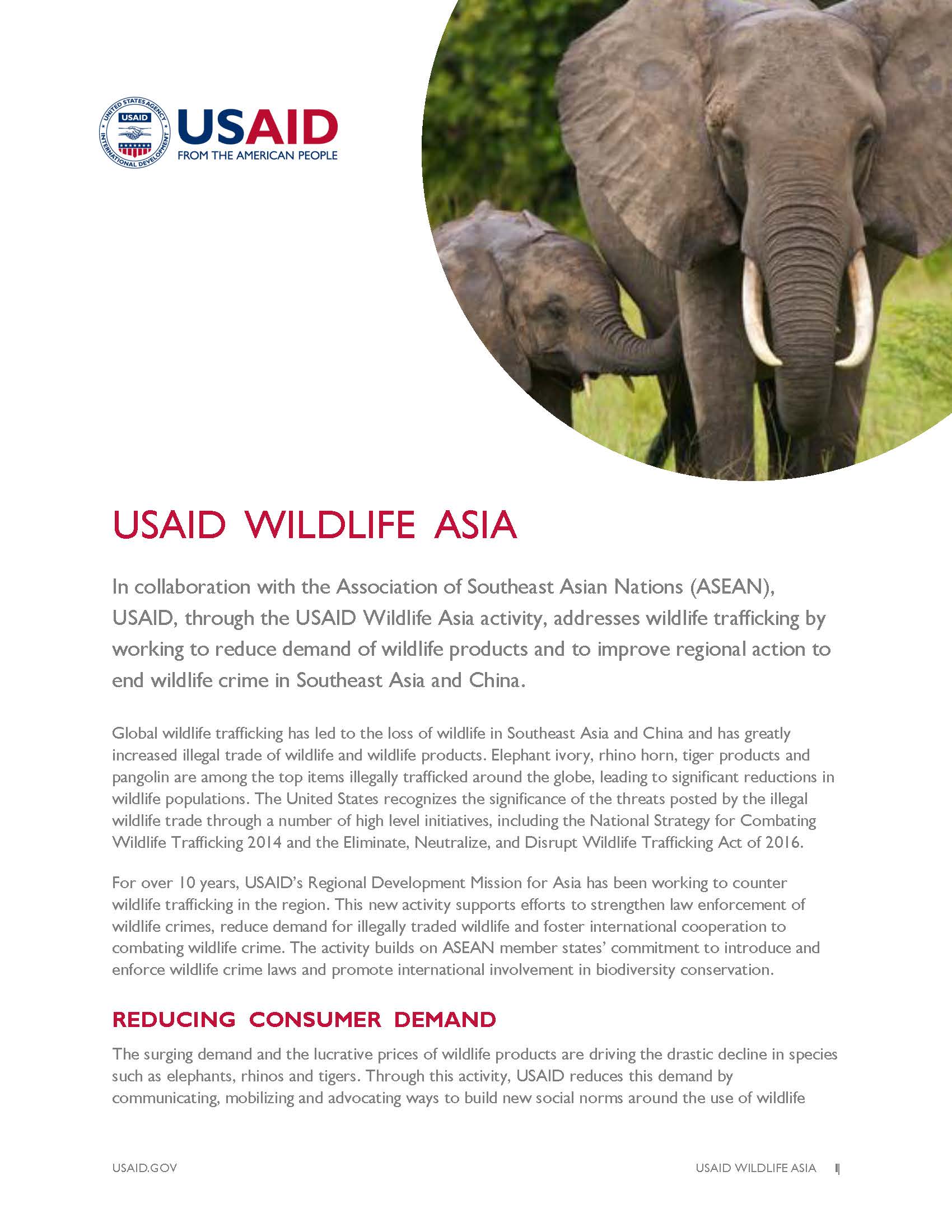USAID Wildlife Asia ![]() (pdf - 123k)
(pdf - 123k)
In collaboration with the Association of Southeast Asian Nations (ASEAN), USAID, through the USAID Wildlife Asia activity, addresses wildlife trafficking by working to reduce demand of wildlife products and to improve regional action to end wildlife crime in Southeast Asia and China.
Global wildlife trafficking has led to the loss of wildlife in Southeast Asia and China and has greatly increased illegal trade of wildlife and wildlife products. Elephant ivory, rhino horn, tiger products and pangolin are among the top items illegally trafficked around the globe, leading to significant reductions in wildlife populations. The United States recognizes the significance of the threats posed by the illegal wildlife trade through a number of high level initiatives, including the National Strategy for Combating Wildlife Trafficking 2014 and the Eliminate, Neutralize, and Disrupt Wildlife Trafficking Act of 2016.
REDUCING CONSUMER DEMAND
For over 10 years, USAID’s Regional Development Mission for Asia has been working to counter wildlife trafficking in the region. This new activity supports efforts to strengthen law enforcement of wildlife crimes, reduce demand for illegally traded wildlife and foster international cooperation to combating wildlife crime. The activity builds on ASEAN member states’ commitment to introduce and enforce wildlife crime laws and promote international involvement in biodiversity conservation.
The surging demand and the lucrative prices of wildlife products are driving the drastic decline in species such as elephants, rhinos and tigers. Through this activity, USAID reduces this demand by communicating, mobilizing and advocating ways to build new social norms around the use of wildlife products. The activities include targeted behavior change campaigns using proven social marketing and social and behavior change communication tools. Anti-wildlife trafficking messages are broadcast widely via billboards and posters at high-traffic sites such as airports, public service announcements and online videos.
STRENGTHENING REGIONAL LAW ENFORCEMENT
USAID strengthens regional law enforcement agencies to effectively locate, apprehend and prosecute illegal wildlife traffickers while improving the policy and regulatory environment to combat wildlife crime. USAID engages with Asian governments and partners to help harmonize regional laws and penalties for wildlife crime, strengthen laws where necessary and support judges and lawyers to bring more cases to court.
PROMOTING REGIONAL COOPERATION
While ASEAN member states have made progress in addressing wildlife crimes over the past decade, additional support is needed to build and increase momentum around counter wildlife trafficking efforts. USAID supports these efforts in Asia and Africa, providing a regional platform for information sharing, communication, planning and convening other administrative support. Host countries can further their commitments to combat wildlife crime by sharing data and trends and collaborating with key stakeholders in the region.
IMPACT AND RESULTS
The USAID Wildlife Asia team applies evidence-based methods and proven technology that drive effective, collaborative decision-making and innovative initiatives across an integrated regional structure. It builds on established relationships in a cross-sectoral, cross-agency approach to end wildlife crime throughout Cambodia, China, Laos, Thailand and Vietnam.
PARTNERS
The activity is implemented by International Resources Group in partnership with a consortium of organizations and companies recognized for leadership in counter-wildlife trafficking and social behavior change communications including FHI 360, International Fund for Animal Welfare, Freeland and Integra. These partnerships capitalize on the collective expertise and experience in the implementing programs that apply world-class strategies and employ innovative technologies for combatting wildlife crime.
Click here for the pdf version.








Comment
Make a general inquiry or suggest an improvement.